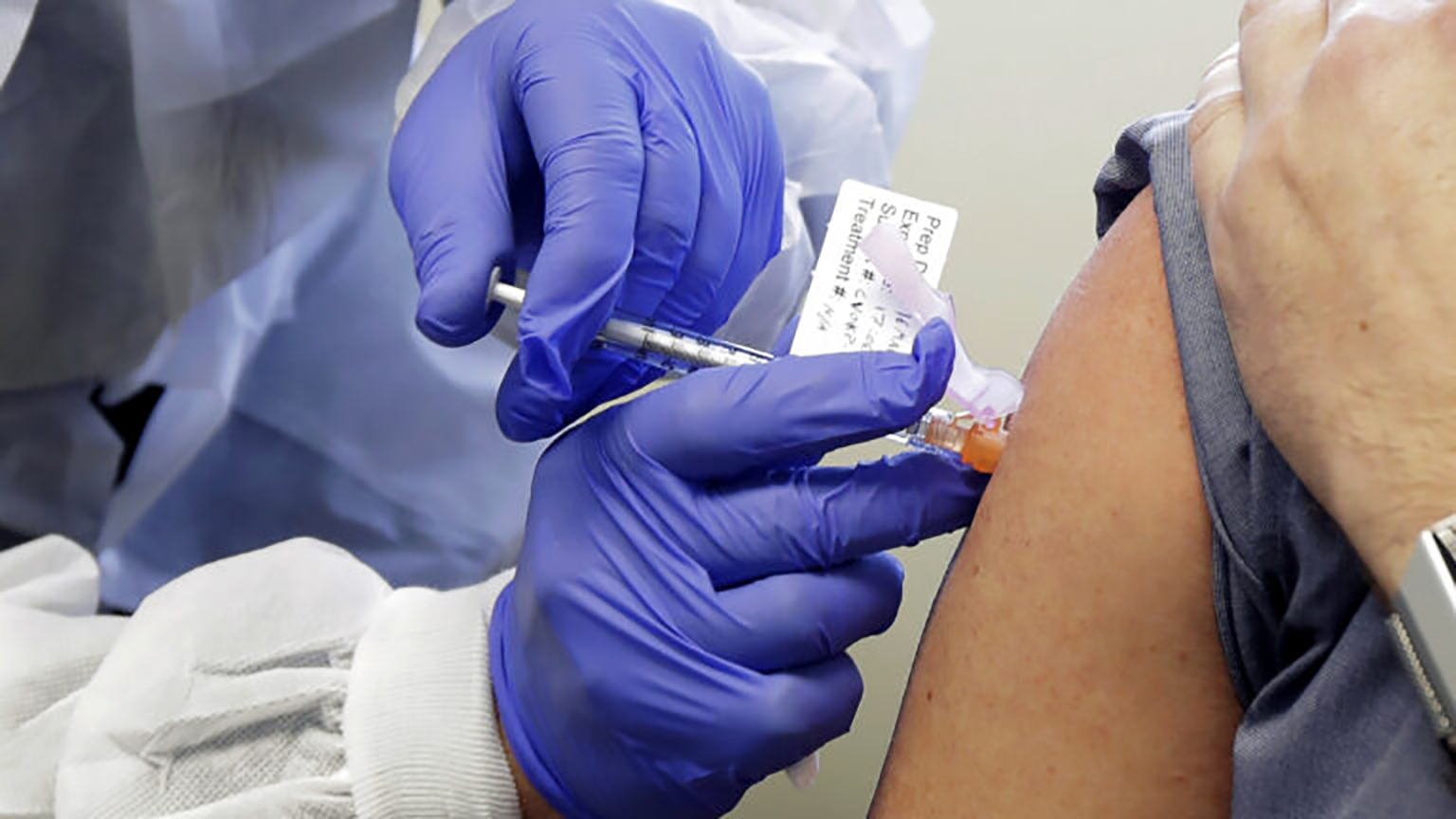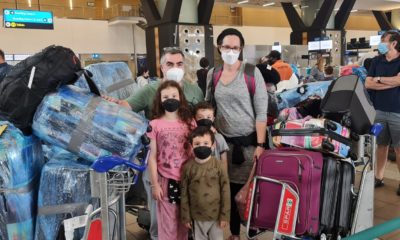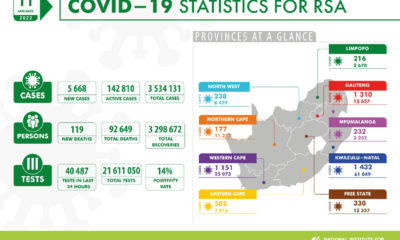
Banner

Experts cautiously optimistic about Omicron
Published
2 years agoon
A 73-year-old Jewish woman with dementia in Johannesburg tested positive for COVID-19 this week, but after 48 hours of being a bit sleepy, she was back to her usual self.
Though she’s one of many people of all ages contracting the highly transmissible Omicron variant, this new mutation may lead to less hospitalisation and death and fewer disruptions to daily life than previous variants, experts say.
Speaking to the SA Jewish Report on Tuesday, 7 December 2021, Netcare Group Chief Executive Dr Richard Friedland said, “What we are seeing across the Gauteng province, which is the epicentre of this new variant, is that the vast majority of patients are presenting mild to moderate flu-like symptoms. We have been treating these patients symptomatically through our Medicross primary care clinics and emergency departments. We have 270 COVID-19-positive cases across our 53 hospitals in South Africa. Seventy-five percent of cases are in Gauteng. About 20% of the cases are in KwaZulu-Natal. We have less than 10% of patients on any form of oxygenation, which is in stark contrast to the other waves when the vast majority of COVID-19 cases were on some form of oxygenation and ventilation. As we speak, we have only six cases being ventilated.”
Friedland thinks this variant is “highly transmissible, but at the moment there’s no evidence of severe illness requiring hospitalisation and leading to death. It’s very early to speculate, but this is the pattern we’re seeing throughout the country. I want to re-emphasise that given that it’s highly transmissible, we still need to continue vaccinating, and most importantly, ensure that everyone is wearing a mask. This is an airborne virus, and mask wearing is incredibly effective.”
“The virus seems to be spreading faster than ever before,” says Dr Darren Joseph, specialist physician at the department of internal medicine at Steve Biko Academic Hospital, on 6 December. “We have seen a high number of re-infections. The feeling on the ground, though, at this stage, is one of cautious optimism. Though we are seeing ever-rising numbers of suspected cases and confirmed positivity, this hasn’t yet translated into a dramatic increase in hospitalisation.”
He points to a recent report authored by Dr Fareed Abdullah of the South African Medical Research Council, “which outlines our hospital complex’s experience very well. At the Steve Biko Academic and Tshwane District Hospitals complex, we saw 166 new admissions with confirmed COVID-19 between 14 and 29 November 2021. Of those still admitted, the vast majority remain out of our critical-care units and roughly two-thirds of our admissions aren’t oxygen requiring. This is in stark contrast to what was experienced at this point in previous waves. Fortunately, vaccination still offers protection, with the report showing that all the current admissions with pure COVID-19 pneumonia were unvaccinated individuals.
“We have also seen a much younger demographic so far in this wave, including a high number of paediatric infections and admissions,” Joseph says.
Though there is cause to be optimistic, “my real concern is that if the narrative around this current wave is that the virus has somehow become less virulent and that this signals the end of COVID-19, we will be sending out the wrong message. The vulnerable remain vulnerable, and if we throw caution to the wind, we still run the risk of having sick patients rapidly overwhelm our limited resources.”
Hatzolah Operations Manager Uriel Rosen says, “Our numbers are rising by 100 a day. We are currently at 1 071 active cases, with 454 new cases this week.” At the same time, “only 1.6% of our cases are on oxygen or need more intense treatment or hospitalisation. This is compared to 10.4% in the last wave. However, we are learning about this variant, and it’s difficult to say categorically that it’s weaker. It doesn’t mean because the numbers of critical are low, there’s no issue.
“Every event where all the protocols aren’t fully observed is a super-spreader,” says Rosen. “It’s spreading like crazy. We need to take precautions.”
Rosen says a lot more children are getting COVID-19. “The highest age group of active cases right now is from 11 to 20. It could be related to children not getting vaccinated or teens having only one vaccination, or it could be how this variant works. No person under 20 on our wellness programme has been hospitalised.”
Regarding holidays, “Go on holiday, but be safe. If anyone from the Johannesburg Jewish community contracts COVID-19 on holiday – even overseas – contact Hatzolah, and we will look after them. We have 115 wellness volunteers and eight staff members that are 1 000% dedicated. They do it with passion and care, with at least 150 to 200 calls a day. We also have eight nurses for intensive cases. There are about 139 nurse rounds per day. We are the luckiest community in the world. At Hatzolah, we are doing it for our brothers, sisters, and family. No Yid gets left behind.”
CSO (Community Security Organisation) Cape Town has witnessed a dramatic rise in cases, from two on 27 November to 127 on 7 December. “They mostly have moderate symptoms, with no one yet requiring hospitalisation,” says director Loren Raize. “This is a drastic change from last year this time, when we had 12 patients already hospitalised out of a total of 47. Close to 90% of our current patients are fully vaccinated, and 5% are partially vaccinated.
“Current patient demographics show that the majority are between the ages of 21 to 30 (30%) followed by 51 to 60 (18%),” she says. “We are expecting an influx of holidaymakers which we have prepared for. We hope that people won’t avoid testing to avoid holiday plans being changed or cancelled.” At the same time, “rushing out to get a test as soon as you are informed of a positive contact is counterproductive and can result in a false negative. This only compounds the problem. Anyone who has had high-risk exposure should isolate for the full period and test only if they develop symptoms.”
Still, the community is being cautious. In Cape Town, the Highlands House Home for the Jewish Aged was locked down to visitors on 26 November. Within the home, it’s business as usual. In Johannesburg, Chevrah Kadisha Chief Executive Saul Tomson says, “We have had some new cases in our residential facilities. We caught most early. Many originated from people who were at public hospitals. I think the big differentiator is that virtually all of our staff and residents are vaccinated. We’re seeing very mild COVID-19. We’re still allowing vaccinated visitors to come in. We’ve implemented measures to curb the spread inside facilities. We’re also doing our best to fast-track boosters for our residents.”
Also in Cape Town, general practitioner Dr Orit Laskov who practices in the heart of the Jewish hub of Sea Point says, “We’re seeing many positive cases again, including kids. Cases I have seen so far have been mild. It’s disheartening still to need to convince patients to get vaccinated.”
In Johannesburg, general practitioner Dr Sheri Fanaroff says, “People who are fully vaccinated and have had COVID-19 before are still getting Omicron. We are also seeing shorter incubation times and a lot of asymptomatic cases. Another trend is that people who are positive with classic symptoms are testing negative initially, both on PCR and in antigen tests. They must still isolate.
“The majority – if not all – the cases I have seen have been very mild,” she says. “I have a number of COVID-19 patients over 70 or even 80 years old who are fully vaccinated. We are monitoring them, but so far, none have required hospitalisation or even home oxygen. Most of the blood parameters and oxygen levels remain good. But what we saw with Delta was deterioration from day eight, so I’m hesitant to say that it’s definitely milder. We must remain cautious.”
So, where to from here? International expert in emergency medicine, Dr Efraim Kramer, says, “Before vaccination, the main strategy was ‘virus evasion’ by social separation, face masks, hand sanitation, limited mass gatherings, and lockdowns. But in the current era, things are different. Especially in the Jewish community, the rate of vaccination is exceptionally high and many people are post-COVID-19 infection.
“Then came Omicron, and its supersonic transmissibility yet low virulence and illness severity. The huge question with this new threat is how to manage it: COVID-19 evasion versus COVID-19 cohabitation. That is, do we evade the virus, or do we learn to live with it – a new strategy, based on ‘get vaccinated, get infected, get on with your life’, preferably in that order. This becomes a reality when there is a highly transmissible virus but its mild infective illness results in low hospital admission rates and complications, especially amongst the vaccinated vulnerable.”
Kramer says this means factoring COVID-19 into everything one does. “For example, at any wedding, adults exercise their personal autonomy by attending the event, fully conversant of the COVID-19 infective risk. Whichever strategy one chooses – evasion or cohabitation – it’s a personal choice and both are correct.”










